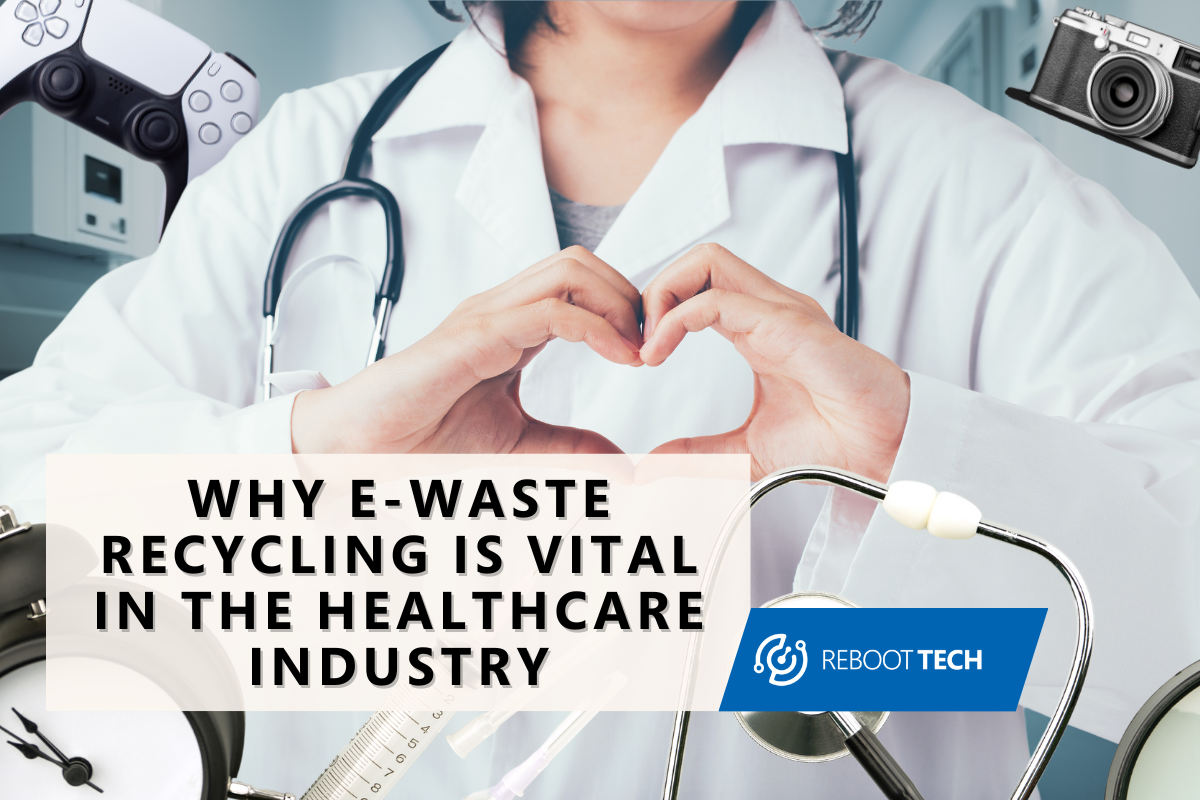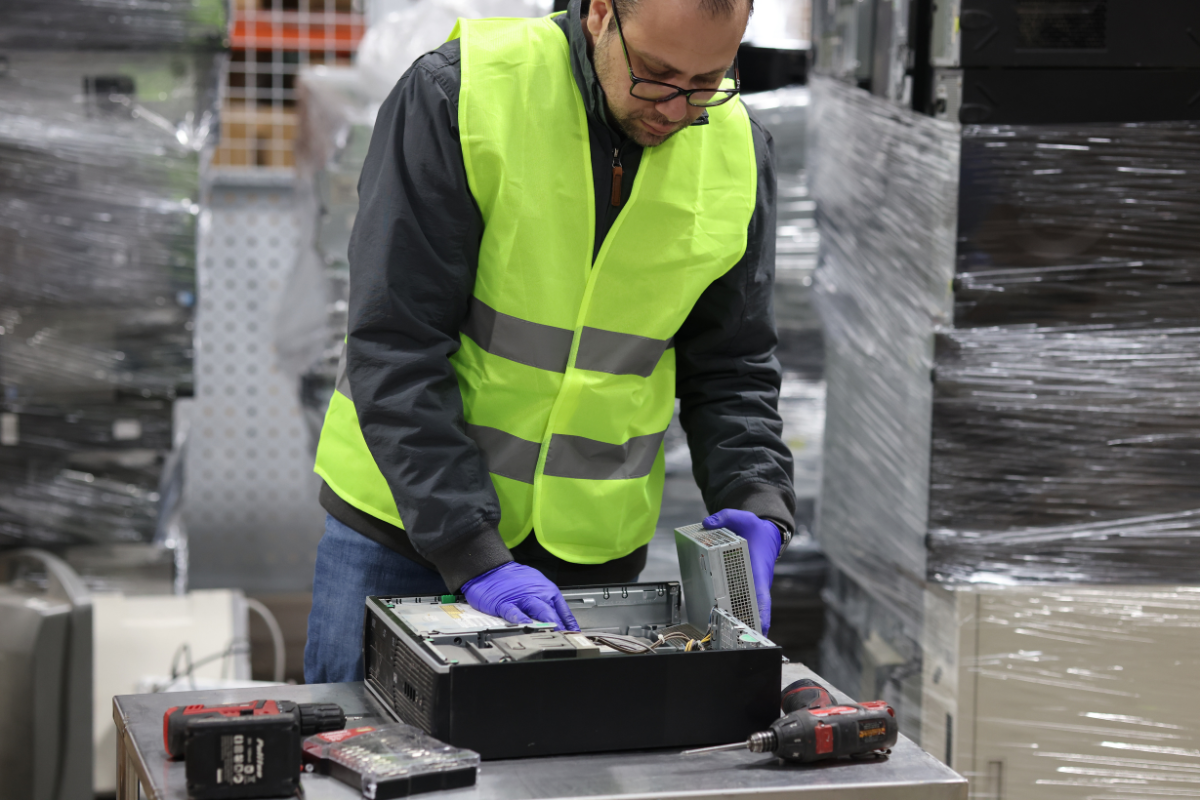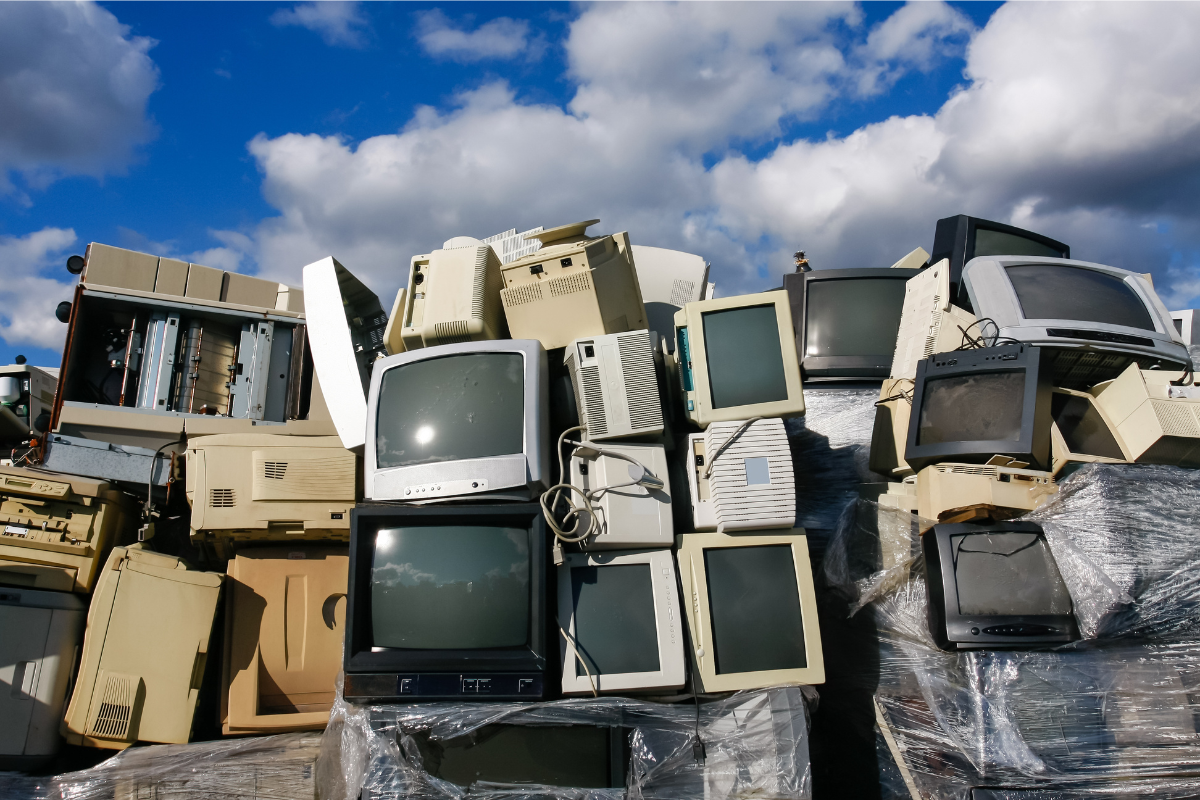
Protecting Patients & the Planet: Healthcare E-Waste Recycling
Imagine walking into your local hospital. You see state-of-the-art medical equipment, computer screens displaying patient data, and advanced diagnostic tools. These technologies are crucial for saving lives and improving patient care. But have you ever thought about what happens to all these electronic devices in healthcare when they become obsolete?
In 2024 alone, there are over 347 million metric tons of unrecycled e-waste on Earth. Shockingly, only 17.4% of this e-waste is collected and properly recycled. This poses a severe threat to our environment and health, particularly in the healthcare industry. In this article, we’ll go into why e-waste recycling is important in the healthcare industry, what you can do, and some educational information about why e-waste is building up so much in healthcare.
Understanding E-Waste in Healthcare
E-waste, or electronic waste, refers to discarded electronic products. In healthcare, this includes items like old computers, medical monitors, MRI machines, and more. As technology evolves rapidly, healthcare facilities continuously upgrade their equipment to provide the best care, leaving a trail of outdated electronics. China, the US, and India are the top producers of e-waste, contributing significantly to this global issue.
The Impact of E-Waste on Health
E-waste contains hazardous materials such as lead, mercury, and cadmium. When not properly disposed of, these substances can leach into the soil and water, causing severe health problems. Exposure to these toxins can lead to:
- Respiratory Issues: Inhalation of toxic materials from improperly disposed of e-waste can cause serious lung diseases.
- Neurological Damage: Heavy metals like lead and mercury can affect brain development and function, especially in children.
- Kidney Damage: Prolonged exposure to cadmium can lead to kidney failure.

These health risks underline the urgency of effective e-waste management, particularly in healthcare settings where safety is paramount.
The Role of Technology in Healthcare
Technological advances have revolutionized healthcare, making processes more efficient and reducing errors. From computerized patient order entry (CPOE) to clinical decision support (CDS) tools, technology is integral to modern healthcare. For instance, CDS systems help clinicians make better decisions by providing timely, patient-specific health information. However, as healthcare technology evolves, so does the volume of e-waste.
Challenges in E-Waste Recycling
Despite the benefits of technology, the healthcare industry faces significant challenges in managing e-waste. One major issue is the improper disposal of electronic devices, which can lead to data breaches. Healthcare facilities must ensure that patient data stored on old devices is completely destroyed before disposal.
Three Key Solutions for E-Waste Management in Healthcare

1. Partnering with Certified E-Waste Recyclers
Working with certified e-waste recyclers like Reboot Tech is essential. These recyclers follow strict protocols to ensure safe and responsible disposal of electronic waste. They are certified by the Department of Defense (DoD) and the National Institute of Standards and Technology (NIST) for data destruction, ensuring patient information is thoroughly erased.
2. Implementing Robust Data Destruction Policies
Patient data security is paramount. Inadequate data destruction can lead to severe consequences, including identity theft and privacy violations. Imagine a scenario where a hospital fails to properly erase data from an old computer, and sensitive patient information falls into the wrong hands. This can result in financial fraud, reputational damage, and loss of patient trust. By following DoD and NIST guidelines, healthcare facilities can prevent such breaches.
3. Upgrading and Recycling Programs
Hospitals and healthcare providers should establish programs for regularly upgrading and recycling their electronics. This not only ensures they use the latest technology for patient care but also responsibly dispose of outdated equipment. Education and training for staff on the importance of e-waste recycling can further enhance these efforts.
The Vital Importance of Data Security
Data breaches in healthcare can have devastating effects. Consider the story of a hospital that did not adequately wipe the data from an old server before disposal. Hackers retrieved sensitive information, including patient health records, social security numbers, and financial details. The breach led to a massive scandal, legal repercussions, and the erosion of patient trust. This scenario highlights the critical need for stringent data destruction policies.

Certified recyclers use advanced techniques to ensure complete data destruction. This includes physical destruction, such as shredding hard drives, and digital wiping methods that comply with industry standards. By employing these methods, healthcare facilities can safeguard patient information and avoid catastrophic data breaches.
Continuous Technological Upgrades and Their Consequences
Healthcare technology is in a constant state of evolution. New devices and software are regularly introduced to improve patient outcomes. For instance, the shift from paper records to electronic health records (EHRs) has streamlined patient data management, reducing errors and enhancing care quality. However, this rapid technological advancement means that old devices become obsolete quickly, contributing to the growing e-waste problem.
Medical equipment, such as MRI machines, CT scanners, and infusion pumps, are regularly updated to incorporate the latest advancements. While these upgrades are crucial for providing the best patient care, they also result in a significant amount of e-waste. Proper management of this e-waste is essential to minimize its environmental and health impacts.
The Environmental and Health Impact of E-Waste
Improper disposal of e-waste leads to environmental degradation. Toxic chemicals from e-waste can seep into the soil and water, contaminating food and water supplies. This not only affects human health but also harms wildlife and ecosystems. For instance, lead and mercury can accumulate in the food chain, posing a risk to both humans and animals.

In developing countries, where much of the world’s e-waste is dumped, the health impacts are even more pronounced. Workers in informal recycling sectors are exposed to hazardous substances daily, leading to serious health issues. By ensuring proper e-waste management, healthcare facilities can contribute to global efforts to mitigate these adverse effects.
Steps Healthcare Facilities Can Take
Healthcare facilities can take several steps to improve their e-waste management practices:
- Educate Staff: Provide training on the importance of e-waste recycling and the procedures for proper disposal.
- Set Up Collection Points: Designate specific areas for collecting old electronics to ensure they are disposed of correctly.
- Work with Certified Recyclers: Partner with certified e-waste recyclers to ensure safe and responsible disposal of electronic devices.
- Implement Data Erasure Policies: Ensure all devices are thoroughly wiped of data before disposal to protect patient information.
- Regular Audits: Conduct regular audits to ensure compliance with e-waste management policies and identify areas for improvement.
Protecting Human Health
E-waste recycling in the healthcare industry is not just a matter of environmental responsibility; it’s crucial for protecting human health and ensuring data security. As we continue to advance technologically, we must also take responsibility for the electronic waste we generate. By partnering with certified recyclers, implementing robust data destruction policies, and continuously upgrading and recycling our electronics, we can make a significant difference.
Let’s make a commitment today. Next time you visit a hospital or healthcare facility, think about the technology around you. Advocate for proper e-waste recycling practices and support efforts to create a safer, healthier environment. Together, we can ensure that our advancements in healthcare technology do not come at the cost of our planet and our health. Recycling e-waste is a crucial step towards a sustainable future.






